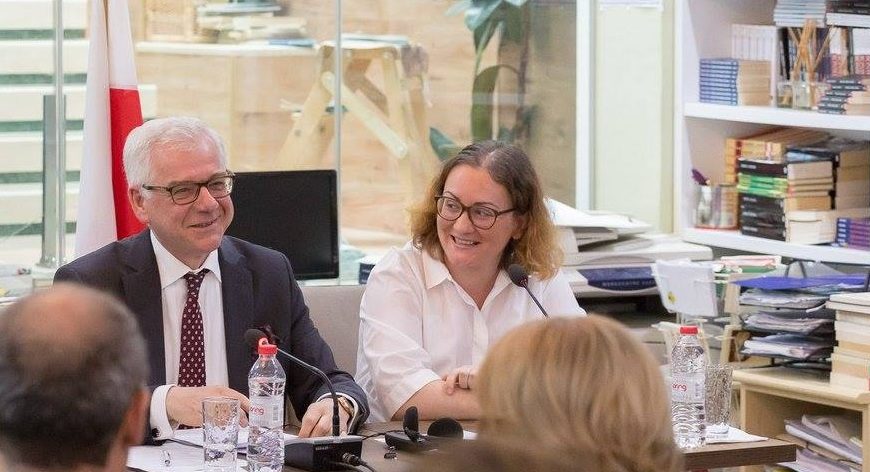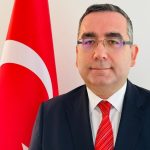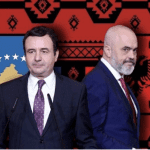Interview with Polish Minister of Foreign Affairs, Jacek Czaputowicz by Executive Director of AIIS, Alba Çela
Poland has always been supportive of the enlargement perspective of the Union, particularly of the integration of the Western Balkans. What are the motives behind this support and what is Poland’s vision for the region?
Ever since Poland joined the European Union, it has been a supporter of the enlargement policy which we consider to be one of the most effective policies offering positive results. By this I mean not only the positive effect EU funds have on economic growth and improved living standards in countries that have joined the EU, but also the geopolitical aspect, namely developing the area of stability and prosperity across Europe. In our opinion the enlargement policy is of paramount importance for the future of the EU. In order to ensure stability and security in Europe, the EU needs to continue its enlargement policy with determination and support reforms in the Western Balkans countries so that in the future they can become EU member states. The enlargement policy also has a beneficial impact on economic growth in the EU and candidate countries, enabling them to better respond to challenges such as improving citizens’ living standards or combating corruption and organized crime.
Unlike some other EU member states, we are not in the dilemma over whether to support enlarging or strengthening the EU. Enlarging the EU leads to strengthening it, and a real accession perspective is the best motivating factor for candidate countries to undertake reforms. For these reasons, a credible enlargement process is in the interest of both the Western Balkans countries and the entire European Union. It is thus a ‘win-win’ situation. The Western Balkans region is of key importance to ensuring security in the context of migration flows, terrorism, cyber and hybrid threats, as well as the destabilising impact from certain third countries. We hope that EU member states will decide in favour of opening accession negotiations with Albania and North Macedonia during the March meeting of the European Council.
Enlargement perspective and methodology are all up for debate and subject to several changes. What is Poland’s position on these topics? Have these issues been discussed during relevant debates that have been going on in your country?
Poland took part in the discussion on the enlargement methodology even before the Commission published its Communication in February 2020. Together with Austria, Slovenia and Italy, we presented our vision of streamlining the enlargement process during the meeting of the General Affairs Council in Brussels in December 2019. The Czech Republic, Lithuania, Latvia, Estonia, and Malta joined in. Many elements outlined in our non-paper were later included in the Commission’s Communication.
We welcome the Commission’s proposal and we believe that it offers a good basis for a compromise. We agree that the enlargement process should be more effective, more credible and more predictable. However, some proposals set out in the Communication need to be clarified before we put them into effect. Also, it is not yet clear which countries will be affected by the new methodology. Those that have already started negotiations will be free to decide whether they want to embrace it or not.
We also believe that adopting the revised enlargement methodology should not delay the decision to open accession negotiations with Albania and North Macedonia. We included this remark in a letter that Poland, together with fourteen other EU foreign ministers, sent to the President of the European Commission last November.
What is Poland’s vision of the Union, its future and role in the world?
After joining the European Union in 2004, our EU membership has been a driving force of Poland’s domestic reforms and development. We want the EU to be open, transparent, secure and citizen-friendly. Our vision of the EU is based on the assumption that it brings together countries which share common values and history. For this reason, the place of the Western Balkans and Albania should be in the EU. Enlargement policy brings tangible results – stability, economic growth and prosperity. We believe that such strengthened Union, speaking with one voice while obviously preserving national sensitivity and identity, treating equally and justly all its member states and enjoying strong transatlantic ties, can have leverage in the world and expand this exceptional area of security and prosperity.
In recent years the attention and resources Warsaw dedicated to our region have increased substantially. What are our mutual interests that stand behind this increase?
Indeed, Poland seeks to support countries of the region not only in the political dimension, but also as far as technology and funds are concerned. We share with the Western Balkans our experiences of the process of systemic transition and our EU accession negotiations. This exchange is organized as part of bilateral projects, such as the so-called Conferences. Conference themes are chosen by our Western Balkans partners and the Polish MFA is responsible for choosing competent experts from Polish institutions.
In 2015 we launched the so-called Enlargement Academy for officials from all the six Western Balkans countries. With European integration being the focus, its programme covers fighting corruption, welfare policy, digitisation, and regional cooperation. In 2017 we launched an annual youth seminar entitled “Remembrance, Understanding, Future.” Under this project, young people from the Western Balkans, Poland and Germany learn about the experiences of Polish-German reconciliation that can inspire a rapprochement between the Western Balkans societies. The initiative is run by the Polish MFA, the Krzyżowa Foundation for Mutual Understanding in Europe, the German Embassy in Warsaw, and the European Commission’s Regional Representation in Wroclaw.
Furthermore, Polish administration has been taking part in the so-called twinning projects in the Western Balkans since 2004, mainly in the area of infrastructure and public funds audit – so far 13 such projects have been completed, and two others are underway. The total value of projects with Polish participation reaches EUR 18 million. At the donor’s conference for Albania, organised following the tragic earthquake, Poland pledged EUR 2.7 million to support the reconstruction of infrastructure in Albania, which places us in a group of the biggest donors. All these projects and initiatives allowed us to strengthen the Poland’s bonds of friendship with the Western Balkans, including Albania.
Bilateral relations between Albania and Poland are moving forward, however their pace could be quicker. What new ideas and proposals can be going forward so that the relations intensify and develop even more?
Poland is Albania’s ally in NATO and a firm promoter of its integration with the EU. When a tragic earthquake struck Albania in November 2019, it was clear to us that we had to show our solidarity and help Albanians. The support we pledged during the donor’s conference for Albania held last week is an expression of the Polish-Albanian friendship and is a continuation of the support for the Western Balkans and Poland’s active involvement in the region.
Poland and Albania pursue cooperation in various areas. At the political level, Poland shares its experience of the period of transformation and accession negotiations through bilateral consultation forum referred to as the Tirana conference. Its last edition was held in September 2019 and focused on cohesion policy and European territorial cooperation. Poland is also active in Albania with regard to twinning cooperation. In 2019, Polish public entities won a tender to undertake a project worth EUR 1.3 million titled Strengthening the capacity of the Albanian Road Authority in applying good governance practices for planning, managing, procuring, implementing and maintaining Road investments. Earlier (in 2016-2018) along with Croatia, Poland ran a twinning project on strengthening external audit in Albania with the Albanian National Audit Office.
Cooperation in the sphere of higher education is also developing well. In the second half of this year, Centre for East European Studies at the University of Warsaw will open its research branch at the University of Tirana. The unit’s activity will cover the whole Western Balkans region and will also include a Polish language course, promoting cooperation between the University of Warsaw and other Polish higher education institutions with the Balkan ones.
Economic cooperation plays an important role in bilateral relations. However, the volume of trade – approximately EUR 70 million per year – is certainly not impressive and falls short of our expectations. Also, in the field of investment, there is much potential for growth. I am convinced that along with Albania’s progress on its European integration path, Polish entrepreneurs will be more and more eager to do business with their Albanian partners.
One concrete field where we see a lot of vitality is tourism and the increasing number of Polish citizens visiting Albania. What needs to be done in this specific area to make sustainable results of our relationship?
Albania is a popular tourist destination among Poles. They appreciate the beauty of its nature and hospitability of the hosts. Most tourists choose coastal towns, however, more and more decide to explore charming mountainous parts of Albania. In 2018, over 150,000 Polish tourists travelled to Albania, and despite a 14 percent fall in 2019, Poles still make up the largest group of foreign tourists visiting Albania, excluding members of Albanian diaspora. We believe that even more Polish tourists will travel to Albania in the future, which will be facilitated by establishing a regular flight connection on the Warsaw-Tirana route by the Polish LOT airlines. At first, in June this year, the carrier will launch a regular seasonal connection which will be operated in the summer. Surely, it will be an important alternative option of reaching Albania, apart from charter flights and travel by land chosen by many Poles.The full text of Minister Jacek Czaputowicz’s exclusive interview for the Albanian Institute for International Studies (AIIS) is available in English at www.tiranaobservatory.com and in Albanian in the next issue of Europa magazine.










